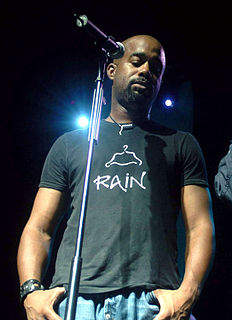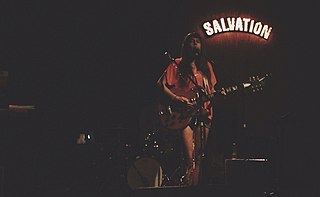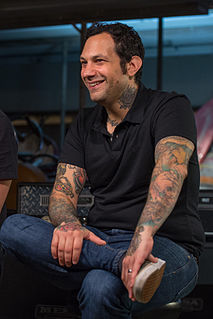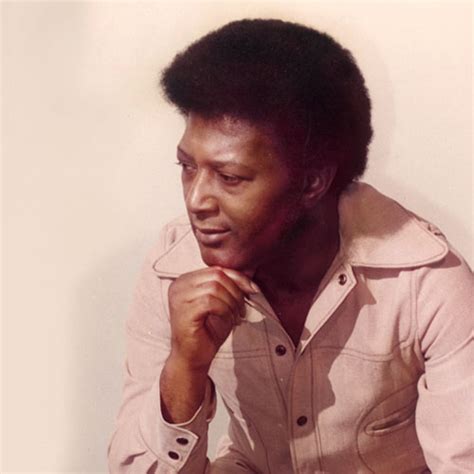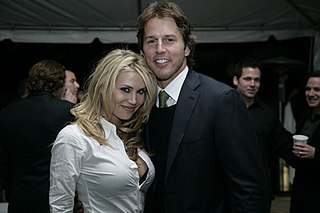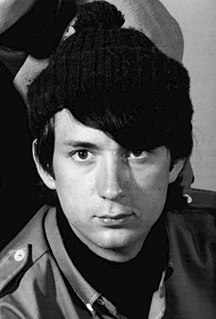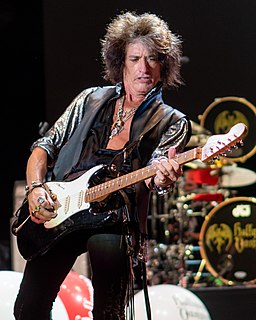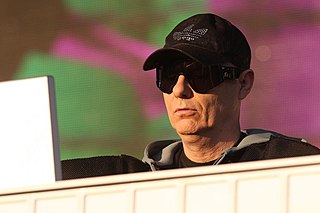Top 1200 Record Companies Quotes & Sayings - Page 19
Explore popular Record Companies quotes.
Last updated on December 20, 2024.
I think we make too many records. One record a year is crazy to me. But some people have to sell tickets. The label has to meet their quarterly number: 'We need a record a year.' All of a sudden, the tail's wagging the dog. It's not the music; it's everything else making the music. That's just backwards. It's wrong.
The 1996 welfare reform law, for the first time, connected welfare benefits with an expectation that recipients would work or participate in training. That work requirement led to record increases in employment and earnings and a record decrease in poverty and welfare dependence after it was enacted.
I think record stores play a huge part in discovering new music. When I was growing up I would spend hours going through all the bins looking for something new that seemed interesting to me and that could relate to what I was listening to at the time. This is why I want to support National Record Store Day.
Under the current U.S. policy, because of this power struggle, American oil companies can't do business with Iran. So I think the ultimate goal of the U.S. administration in Iran is regime change, to put into power a pro-Western government that will eliminate the strategic challenge to U.S. interests and, at the same time, allow the lifting of sanctions and allowing American oil companies to do business with Iran.
Like, when we did Parliament and Funkadelic and Bootsy, it was actually one thing. But there were so many people that you could split them up into different groups. And then, when we went out on tour and they [the record companies] would see us all up there together - we had five, six guitars playing at one time, not including the bass! -, they said: "Wait a minute, that's just one whole group, selling different names!" But it wasn't - we had enough people in the group that each member would have a section to be another group. So now we're finally starting to get them to understand that.
Companies are actually much better than governments and other bureaucracies at organizing in a holistically efficient way the extremely complex path from the examination of molecules all the way to the delivery of medicines to patients. Already in the conception and selection of research projects, companies would anticipate all the challenges down the line that they will need to overcome in order to achieve actual health impact. Bureaucratic organizations, by contrast, are notoriously bad at this sort of optimizing.
I'm not critical of the people who do psychotherapy. The therapists in the trenches have to face an awful lot of the social, political, and economic failures of capitalism. They have to take care of all the rejects and failures. They are sincere and work hard with very little credit, and the HMOs and the pharmaceutical companies and insurance companies are trying to wipe them out. So certainly I am not attacking them. I am attacking the theories of psychotherapy.
All I can focus on right now is playing that record as best we can each night on stage, and that every article or radio spot that I do gives the best depiction of what we're trying to say with this record. The next door will open when it's time to open, and hopefully I'll be lead into the right one.
The fans reaction to the record (Red) is incredible. Taylor has been reading many tweets lately and wanted to thank her fans with what they ask for the most.
We're planning to record the 10 Minute Version of All Too Well and a music video. She's busy with touring right now but we will find some time.
Tech stocks were the cubic zirconium of the market. They looked good and were sexy, but they just were a way for the company selling them to make money. That's always going to be transient in terms of the stock market. What's real is that companies have to compete. Technology used well is a great tool to enable that if only because most companies dont use technologies well.
The spirit of Burzum never changed, but my ability to make music changed dramatically when I was imprisoned. It is more or less impossible to record music in prison, and the only music I could record was electronic music, when I was allowed to have a synthesizer for a few months in 1994 or 1995 and in 1998.
Drug companies spend more on advertising and marketing than on research, more on research on lifestyle drugs than on life saving drugs, and almost nothing on diseases that affect developing countries only. This is not surprising. Poor people cannot afford drugs, and drug companies make investments that yield the highest returns.
Many companies believe incentives, financial incentives, are the answer to every problem or issue. But people are motivated by much more than money. In particular, people like to feel good about themselves and maintain their self-esteem. If companies spent more time working on people's feelings of self-worth, they wouldn't have to try, often unsuccessfully, to bribe people to do work.
I remember 'The Shepherd's Dog' record being not necessarily a political record, but a reaction to socio-political situations in America. And it didn't manifest itself as protest or propaganda songs, but there's a lot of surreal imagery that was born out of really me being surprised Bush got re-elected in '04.
Once you say you're going to have to tax them coming in, and our politicians never do this, because they have special interests and the special interests want those companies to leave, because in many cases, they own the companies. So what I'm saying is, we can stop them from leaving. We have to stop them from leaving.
The reason for backing tracks is to not veer off too far from the record and have what the fans actually want to hear. Artists use backing tracks just so they can stay close to the record and what the consumer heard for the first time. It's not to be confused with lip synching or anything like that cos that's not happening at all.
The other dynamic keeping the stock market up - both for technology stocks and others - is that companies are using a lot of their income for stock buybacks and to pay out higher dividends, not make new investment,. So to the extent that companies use financial engineering rather than industrial engineering to increase the price of their stock you're going to have a bubble. But it's not considered a bubble, because the government is behind it, and it hasn't burst yet.
When I worked at Microsoft, I got to go and visit a bunch of different companies. Probably a hundred different companies a year. You'd see all the different ways they'd work. The guys who did Ventura Publisher one day, and then United Airlines the next. You'd see the 12 guys in Texas doing Doom, and then you'd go see Aetna life insurance.
The not-quite-sort-of lie works here too - often an ad will announce that "Congressman Johnson voted for a bill that gave tax breaks to companies like Enron." True - although the bill allowed all companies to accelerate depreciation of copying machines. Yes, Enron benefited, but Enron also benefited from the revolution of the Earth around the sun. Hardly an argument to freeze the planet in one spot.
People who work for me are working for what I believe in. The leaders who run our companies do so on the basis of those who came first and who said, "A company is its people." I hope my companies are run on the basis of praising their workers and looking for the best in them, not criticizing them. In the same way that you water a plant and it sprouts leaves, people flourish when you praise them.
It's a battle between record company, between producer and between mastering engineer. Because the louder you make your record in a digital process, the more dynamics are squished out of it. Nobody knows exactly what happens, but the dynamics in the performance disappear, and everything is at the same volume.
Now the Japanese companies are more focused on that. To have two independent directors - I think it's good to have outside people look at you and think of what you could be doing better. Those are voluntary, but most of the companies told me they're going to do it. And I think it's good for them to say our returns on equity, for example, should be higher. Also, I think some could be more ambitious.
The first memory I have was my sisters dancing to the radio when they played records by Benny Goodman and Harry James and of the sort. But the record that got me was a record by Derek Sampson, who was a young guy, called 'Boogie Express,' and it was boogie-woogie. Really, it was on fire, and that got me.
Some years ago one oil company bought a fertilizer company, and every other major oil company practically ran out and bought a fertilizer company. And there was no more damned reason for all these oil companies to buy fertilizer companies, but they didn't know exactly what to do, and if Exxon was doing it, it was good enough for Mobil and vice versa.
The thing is that I have a really intense, almost compulsive need to record. But it doesn't end there, because what I record is somehow transformed into a creative thing. There is a continuity. Recording is the beginning of a conceptual production. I am somehow collapsing the two - recording and producing - into a single event.
I feel less and less like that every year, and I guess maybe even more so with every new record that I put out. I just think, as the years go by, it's harder and harder to really find a reason to be annoyed that you made something that people want to continuously talk about. Certainly there are contexts in which the record can be discussed which will get me on the defensive and make me want to put some kind of calibration or some kind of context on what the record means in relation to my career as a whole.

